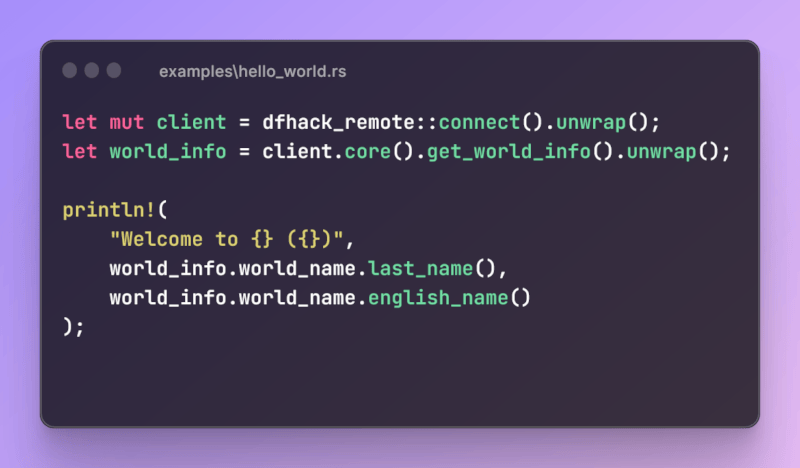15 releases (8 breaking)
| new 0.10.0 | Mar 21, 2025 |
|---|---|
| 0.9.0 | Apr 21, 2024 |
| 0.8.0 | Nov 20, 2023 |
| 0.7.0 | May 13, 2023 |
| 0.4.1 | May 1, 2022 |
#177 in Game dev
2MB
43K
SLoC
dfhack_remote
dfhack_remote is a library allowing users to interact with Dwarf Fortress using a remote API.

Dwarf Fortress is a video game by Bay 12 Games. DFHack is a fan made mod for Dwarf Fortress adding many features to the game. One of these feature is a remote API enabling the remote control of certain Dwarf Fortress features. This crates is a client for this remote API, enabling rust tool developers to interact with Dwarf Fortress.
Examples
Displaying some information about the current world.
let mut client = dfhack_remote::connect().unwrap();
let world_info = client.core().get_world_info().unwrap();
println!(
"Welcome to {} ({})",
world_info.world_name.last_name(),
world_info.world_name.english_name()
);
Pausing or unpausing the game
let mut client = dfhack_remote::connect().unwrap();
let status = client.remote_fortress_reader().get_pause_state().unwrap();
client.remote_fortress_reader().set_pause_state(!status.reply).unwrap();
The generated API is mostly a direct translation from the raw RPC, and as such is quite verbose.
It includes some minor syntaxic sugar such as omitting EmptyMessage inputs.
Every command returns a [Reply] struct containing the reply itself and optionally additional messages.
The DFHack API
The DFHack remote API relies on protobuf for serializing messages. This means that all the input and output of each message is relying on protobuf code generation to create a type-safe experience.
dfhack_remote is using the crates protobuf and protobuf-codegen-pure for the protobuf code generation.
However, DFHack is not using gRPC for representing the remote calls, but a specific protocol.
The definitions of RPC of DFHack is described with comments inserted in the .proto files. In order
to bind all the RPC, this crates is generating all the API entrypoints directly from the DFHack source code.
Building for a different DFHack version
The DFHack source used for code generation can be controlled at build time using the DFHACK_ZIP_URL
environment variable. For example, setting this environment variable to https://github.com/DFHack/dfhack/archive/refs/heads/develop.zip
at build time would target the latest changes included in DFHack.
In order to trigger the download and source regeneration, DFHACK_REGEN and DFHACK_DOWNLOAD must also be set to 1.
Crate structure
This crate main entrypoint is the [connect] function.
The code is split into three crates:
dfhack_proto_srcsdownloads and extract the proto from the DFHack source code at build time.dfhack_protobuilds the protobuf messages and plugin structs containing the RPCdfhack_remoteis the main entrypoint. It implements the actual protocol and exposes the features.
For ease of use, dfhack_remote reexports all the generated code from dfhack_proto.
Internally, the message module handles the serialization/deserialization logic that sits on top of protobuf,
and the channel module handles the exchange flow.
Testing
Most of the tests require the ability to communicate with Dwarf Fortress.
This can be enabled by setting the environment variable DF_EXE to the Dwarf Fortress executable.
Once this is setup, you can run these tests with the test-with-df feature enabled:
cargo test --features test-with-df
This will run the first save of this Dwarf Fortress installation. You should prepare a dedicated save with a pocket world for that purpose.
Release
The versioning is done through cargo release. cargo release --workspace --execute, to release current version
and switch to next patch, or cargo release [level] --workspace --execute (minor, major).
Dependencies
~2–5.5MB
~105K SLoC